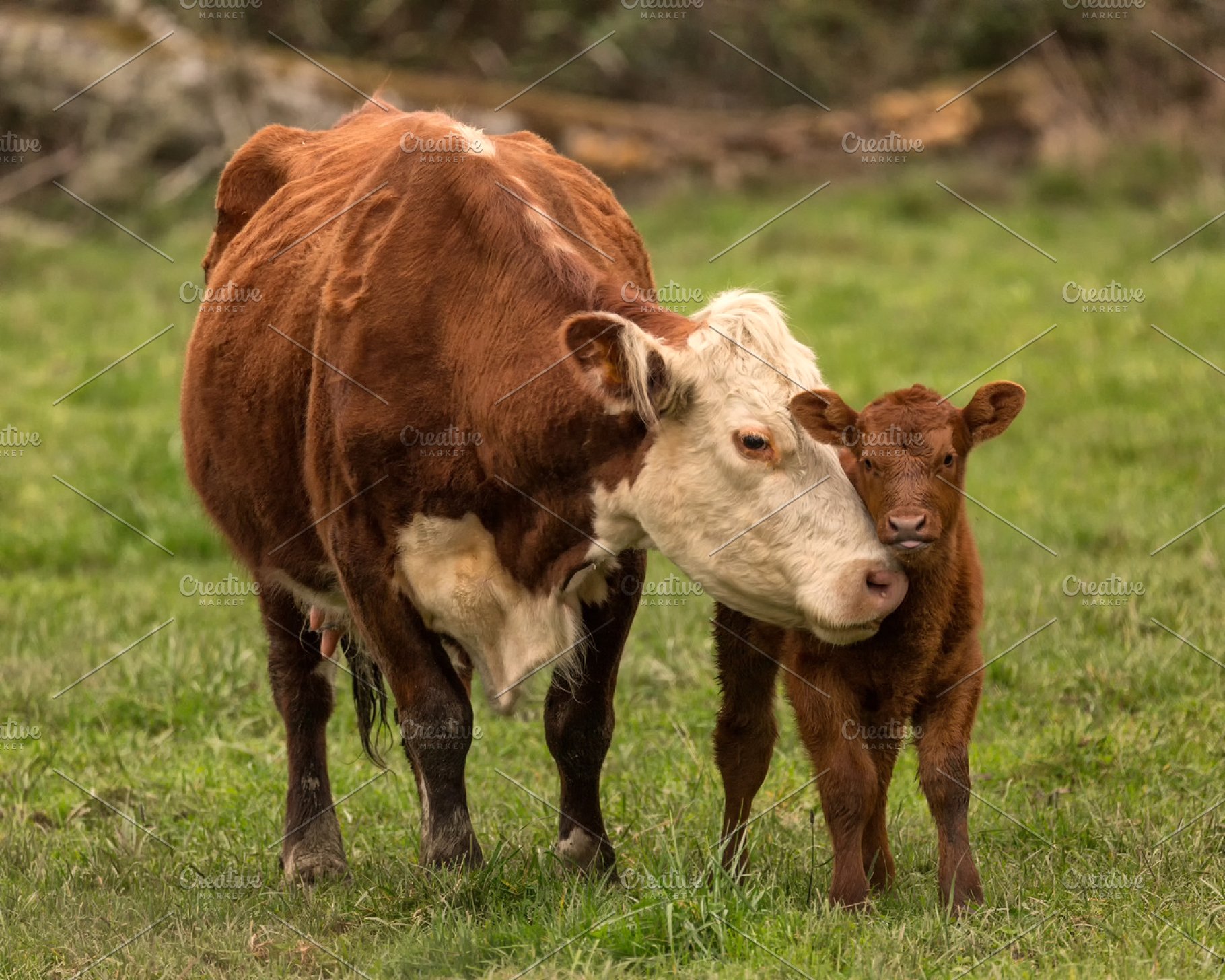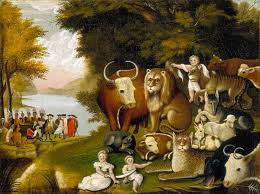The adult discussion group at church was talking about “Faith and Creation Care.” As expected, the creation stories of Genesis and some of the robust creation psalms (8, 65, 104, 148) were in the mix.
Edith, a spry woman in her 90s spoke up.

I was a kid in the Great Depression. My parents had ten mouths to feed. Sometimes there was nothing to eat. My mother would send me out to the corn crib to gather some ears of hard, dried corn. She’d grind it in the coffee mill and then add water to make corn mush to feed us. So if my father saw a squirrel or raccoon nosing around the corn crib, he had no qualms about shooting the animal on the spot. It was us or him.
Her comments were a helpful reminder, a blast of reality when our discussion might have been getting too romantic and cozy about our relationship with God’s other creatures. Edith’s words reminded me a bit of Karl Barth’s claim that vegetarianism is “wanton anticipation” of God’s coming future of reconciliation and wholeness.
More than Karl Barth, however, Edith brought to mind my own mother. If she were living, she would be about Edith’s age. She too grew up on a farm during the Great Depression.
Of course, there is much I loved and appreciated about my mom. But when it came to animals and creation, she was pretty cold, pretty matter-of-fact. I’m not sure she ever really accepted dogs in the house, but certainly not in bed! I recall her once saying something like, “Why should we care if some frogs or birds go extinct? There are plenty of others.”
It would be easy enough to attribute my mother’s thinking to the harsh realities that her family faced in her younger years. Animals were there to be eaten. Nature was powerful and frightening. If nature wasn’t pushed back and tamed, it would push you back.
Empty Sacraments. Empty Universe?
Our book group went on to explore a “sacramental view” of creation. A sacramental view is said to see creation and objects around us as mediating God, as reflecting, pointing toward, even sharing the divine.
It was then that a light went on.
My mother’s austere and anti-Catholic views barely had a “sacramental view” of the Sacraments themselves. How could she–and thousands of other Reformed folk–ever have a sacramental view of creation? To talk of creation as sacred, to see objects as pointing us toward the divine, was nonsense, if not dangerous.

Sacraments were bare signs, object lessons, empty reminders. If the water of baptism was only tap water, and if the grape juice and Wonder Bread of the Supper simply came from the grocer, then how could amber waves of grain stir the soul, or the love of a cow for her calf remind us of God? (Obviously, this stern outlook couldn’t prevail all the time. Plenty of farmers did see beauty in their fields, goodness in their soil, and love in their livestock.)
In wanting to scrub away any residue of superstition, magic, or anything remotely Roman Catholic, did our Reformed ancestors accidentally scrub the creation clean of any divine presence? Just like the most reckless of capitalists are unknowing Marxists–where money and economics are the only things that matter; so the starkest Reformed minds were unwitting accomplices of cold-hearted positivists and hard-boiled empiricists.
Empty Sacraments lead to an empty universe. There is nothing spiritual or mysterious, or maybe not even of real value, in the created world. It is all just stuff. Chaff for the burning.
Bad sacramental theology produces bad theology of creation.
Have Any Solutions?
Exactly what am I longing and lobbying for? It isn’t a full-on Roman Catholic understanding of transubstantiation. I’m doubtful that those categories and tired debates are the way forward.
But I do believe that if we allow wonder and holiness, beauty and the inexplicable in the Sacraments, we will see it in creation as well.
What does it truly mean to say that things can be holy? I’m a bit hard pressed to come up with a quick and cogent response. Maybe that the Holy Spirit seems to be unstinting?
All of this is an effort, a good and important effort, to move toward a more Christocentric understanding of creation. As mentioned earlier, most Christian discussions of creation-care center around the Genesis stories and nature psalms. Okay, but shouldn’t we also ask how Jesus and the incarnation change the way we view creation? A sacramental view starts us down this path. Humans are of great value because God became one. This earth is blessed and beautiful because God visited it.
Buy This Book

This is just one of many good things about Jesus Loves You and Evolution is True, a new book by Jason Lief and Sara Tolsma. (Full disclosure, of course, Jason blogs here on “The Twelve.” Jason and Sara are the current editors of the Reformed Journal. Both are longtime friends. I think I knew them both before they knew each other.)
It is a very good book. Accessible, yet never simplistic. In-depth, but never mind-numbing. Even more, it speaks about creation and evolution from a Christocentric, incarnational perspective. Buy it. Read it. Share it. The book is said to be aimed especially at leaders of youth groups. In reality everyone can benefit from it.
Coda

I mentioned Karl Barth’s well-known saying about “wanton anticipation,” his claim that vegetarianism, especially as an attempt to live Isaiah’s vision of the Peaceable Kingdom (wolf/lamb, calf/lion, not hurt or destroy…), is undue hastiness, excessive eagerness for the coming of the Kingdom. As a sort-of-vegetarian and a fan of Barth, I’ll also share two long quotes from Barth about the killing of animals. Apologies for the sexist language.
If there is a freedom of man to kill animals, this signifies in any case the adoption of a qualified and in some sense enhanced responsibility. If that of his lordship over the living beast is serious enough, it takes on a new gravity when he sees himself compelled to express his lordship by depriving it of its life. He obviously cannot do this except under the pressure of necessity. Far less than all the other things which he dares to do in relation to animals, may this be ventured unthinkingly and as though it were self-evident. He must never treat this need for offensive and defensive action against the animal world as a natural one, nor include it as a normal element in his thinking or conduct.” (CD III.4, 352)
The slaying of animals is really possible only as an appeal to God’s reconciling grace, as its representation and proclamation. It undoubtedly means making use of the offering of an alien and innocent victim and claiming its life for ours. Man must have good reasons for seriously making such a claim. His real and supposed needs certainly do not justify it. He must be authorised to do so by his acknowledgement of the faithfulness and goodness of God, who in spite of and in his guilt keeps him from falling as He saved Noah’s generation from the flood and kept it even though it was no better as a result. Man sins if he does it without this authorisation. He sins if he presumes to do it on his own authority. He is already on his way to homicide if he sins in the killing of animals, if he murders an animal. He must not murder an animal. He can only kill it, knowing that it does not belong to him but to God, and that in killing it he surrenders it to God in order to receive it back from Him as something he needs and desires. The killing of animals in obedience is possible only as a deeply reverential act of repentance, gratitude and praise on the part of the forgiven sinner in face of the One who is the Creator and Lord of man and beast. (CD III.4, 354-55)

